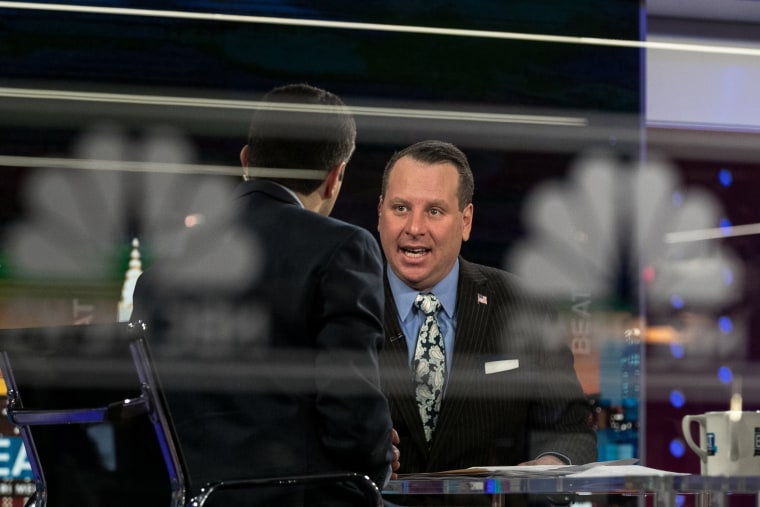It’s hard to know where to begin with the 15 minutes of fame currently being enjoyed by Sam Nunberg, a 36-year-old former aide to President Donald Trump and, at least by his accounts, a recent recipient of a grand jury subpoena from special counsel Robert S. Mueller III. (It is entirely possible that this entire episode, and the purported subpoena published by the Washington Post, is a figment of Nunberg’s imagination.) “Screw that,” Nunberg told CNN with respect to honoring the subpoena and testifying before the grand jury; “Why do I have to go? Why? For what?” Nunberg later seemed to walk back some of his earlier comments, saying he simply didn't "want to make it easy" for Mueller.
Believe it or not, Nunberg is a lawyer — a graduate of Touro Law Center in New York, and a member in good standing of the bars of both New York and the District of Columbia (at least for the moment). He should therefore know the answers to his own questions. But just in case, here’s a quick primer on federal grand juries — and why Nunberg’s conduct is not only bizarre, but could potentially lead to far more serious legal and ethical problems.
Nunberg’s conduct is not only bizarre, but it could soon lead to far more serious legal and ethical problems.
Federal grand juries are generally comprised of 23 citizens drawn from the local jury pool — which, in Nunberg’s case, appears to be the District of Columbia. The Founders viewed grand juries as an important and indispensable check on government prosecutors, writing into the Fifth Amendment the requirement that “No person shall be held to answer for a capital, or otherwise infamous crime, unless on a presentment or indictment of a Grand Jury.” Unless government prosecutors can convince a grand jury that probable cause exists, no prosecution can go forward and actually charge the defendant.
As part of these probable cause determinations, grand juries have the power to issue subpoenas — demands for the testimony of witnesses or the production of documents that are relevant to its proceedings. A recipient of a grand jury subpoena is allowed to object (by asking a judge to “quash” the subpoena), but only if the subpoena exceeds the grand jury’s authority, or if the testimony or documents are protected from disclosure by a constitutional privilege (such as the Fifth Amendment’s privilege against self-incrimination or executive privilege).
Simply ignoring the subpoena (or tearing it up on camera, as Nunberg had threatened to do), is not exactly covered by the rules.
To be sure, the prosecutor can still seek to compel the witness’s testimony even at that point — for example, by granting the witness immunity from prosecution for statements that might otherwise incriminate him. But most of this back-and-forth usually plays out behind the scenes, with discussions between the witness, his lawyers, the prosecutors, and where necessary, a judge. Indeed, to protect the integrity of grand jury proceedings, they (and things coming out of them, like subpoenas) are usually kept secret until and unless indictments are handed down and unsealed. Usually, that is, unless you are Sam Nunberg.
Simply ignoring the subpoena (or tearing it up on camera, as Nunberg had at one point threatened to do), is not exactly covered by the rules. Instead, such conduct would render Nunberg a “recalcitrant witness,” bringing him within the scope of a 1970 federal statute that provides for the confinement of such individuals, with no bail, until and unless they cooperate (and for up to 18 months). And although Mueller, as the prosecutor, can help force the issue by bringing the matter to the attention of the presiding federal judge, the statute also gives the judge the authority to throw Nunberg in jail even without a request from Mueller.
In other words, Nunberg’s (apparent?) strategy will land him in jail so long as either Mueller or the judge overseeing the grand jury invokes the recalcitrant witness statute. This isn’t about Nunberg thumbing his nose at the special counsel; it’s about disrespecting the integrity of the federal courts. They tend not to react too kindly to such abuse.
This isn’t about Nunberg thumbing his nose at the special counsel; it’s about disrespecting the integrity of the federal courts.
Finally, as if that weren’t bad enough, Nunberg’s antics will almost certainly create trouble for him with the Washington D.C. and New York bars (and any other state bars to which he is admitted to practice). Rule 8.4(d) of the D.C. Rules of Professional Conduct prohibits conduct “that seriously interferes with the administration of justice,” a provision that has been interpreted to cover an attorney’s failure to comply with a subpoena from the D.C. Bar (to say nothing of a grand jury). The analogous New York rule is even broader, prohibiting conduct “that is prejudicial to the administration of justice.”
It should follow pretty easily that failure to comply with a duly issued grand jury subpoena is at least as bad — and would therefore represent a serious breach of Nunberg’s professional ethics obligations, subjecting him to discipline up to and including disbarment from the practice of law. And if this whole kerfuffle is, indeed, a figment of his colorful imagination, his ability to practice law going forward may still be compromised.
Reasonable people will surely continue to disagree about the merits of the special counsel’s investigation. There is no doubt that everyone has an obligation to comply with lawful court orders — and lawyers only the more so. Nunberg should know better — and if he doesn’t, I think we can count on the courts, his state bars, or both to remind him soon.
Steve Vladeck (@steve_vladeck) is a professor of law at the University of Texas School of Law whose teaching and research focus on federal jurisdiction, constitutional law, and national security law. Steve is co-editor-in-chief of the Just Security blog (@just_security) and co-host of the National Security Law Podcast (@nslpodcast).

